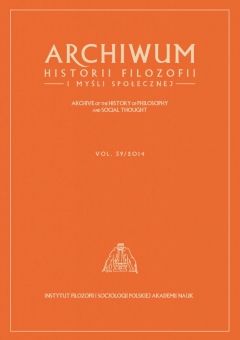Zum „Sein des Seins“ mittels der „Logik der Logik“: Heinrich Rickerts kritische Ontologie
To the “Being of Being” through the “Logic of Logic”: Heinrich Rickert’s Critical Ontology
Author(s): Maja SobolevaSubject(s): Epistemology, Logic, Ontology
Published by: Instytut Filozofii i Socjologii Polskiej Akademii Nauk
Keywords: Ontology; epistemology; concept of being; representational thinking;
Summary/Abstract: Rickert’s philosophy is marked by such themes as „knowledge”, „value”, „culture” and „history”. Epistemology is a basis of his entire philosophy and underlies his system of philosophy. His guiding principle is that „die Wissenschat vom Weltganzen ein Gedankenganzes sein muss“ (Rickert 1930, p. 6). Investigations on the logic of predicate and the problems of ontology form an important part of Rickert’s epistemology. The aim of this paper is to analyze the concept of being in his theory on the background of Heidegger’s phenomenological theory of being and König’s hermeneutical theory of being. Being as a predicate proves to be neither a real object nor a mere form of thought, but it is rather a form of knowledge. Thus, the ontological investigations are connected with the logical studies of cognition of the world. Logic receives the primacy for ontology, besides, Rickert distinguishes between formal and transcendental logic. His research in the field of transcendental logic deals with the problem of objective (representational) thinking which is in focus of modern epistemological debates. The question here is whether the predicative thinking is able to grasp the whole reality. The reality proves in Rickert’s theory as a manifestation of the truth value, where truth is understood as a theoretical truth. Is such a concept of reality not too tight? One alternative was suggested by hermeneutics, based on philosophy of life. The latter supplements the predicative thinking with the non-predicative, and sees it as a form of cognition. The comparison of these theories will give a new insight about the concept of being, and, by means of it, contribute to the clarification of the concept „human science”.
Journal: Archiwum Historii Filozofii i Myśli Społecznej
- Issue Year: 59/2014
- Issue No: 59
- Page Range: 231-240
- Page Count: 10
- Language: Polish

